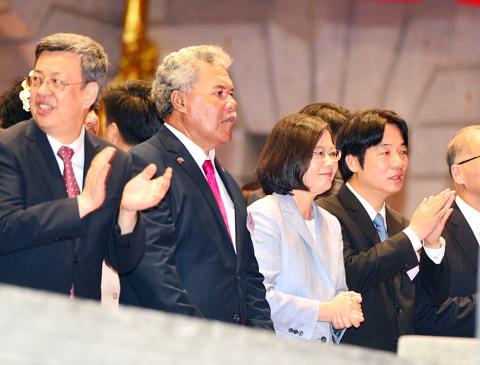Ching Fu Shipbuilding Co (慶富造船) twice this year asked the Ministry of Foreign Affairs for help securing a loan, but the requests were rejected, a source close to the matter said yesterday.
In its requests to the ministry, Ching Fu said the loan was for a shipbuilding project it had undertaken in Tuvalu, one of the nation’s allies in the South Pacific, the source said on condition of anonymity due to the sensitivity of the issue.
The company had built a ship for Tuvalu in 2009 at a cost of US$15.5 million and was working on a second vessel that it started in 2012 and was scheduled to complete in 2015, the source said.

Photo: Wang yi-sung, Taipei Times
However, Ching Fu has not finished the second ship, and on June 3 and June 16 it sent letters to the ministry asking for help to secure a loan to complete the project, the source said.
The ministry turned down the two requests, saying that the contract was between Ching Fu and the Tuvaluan government, and that it would be inappropriate for the ministry to intervene, the source said.
The ministry said it would become involved only if the dispute between the two parties put the nations’ diplomatic relations at risk, the source said.
Asked to comment on the issue, ministry spokesman Andrew Lee (李憲章) said the ministry did not use taxpayers’ money to help Ching Fu complete the shipbuilding projects in Tuvalu.
It was purely a commercial dispute between the Tuvaluan government and Ching Fu, Lee said, adding that the ministry was never involved.
He said the Tuvaluan government has not asked the ministry or Taiwan’s embassy in that nation to assist in the matter.
However, the ministry did ask the embassy to closely monitor developments in the case, Lee said.
Ching Fu has been embroiled in a fraud scandal over a contract that it won from the Ministry of National Defense in October 2014 to build six minesweepers at a cost of NT$34.9 billion (US$1.16 billion at the current exchange rate).

AGING: As of last month, people aged 65 or older accounted for 20.06 percent of the total population and the number of couples who got married fell by 18,685 from 2024 Taiwan has surpassed South Korea as the country least willing to have children, with an annual crude birthrate of 4.62 per 1,000 people, Ministry of the Interior data showed yesterday. The nation was previously ranked the second-lowest country in terms of total fertility rate, or the average number of children a woman has in her lifetime. However, South Korea’s fertility rate began to recover from 2023, with total fertility rate rising from 0.72 and estimated to reach 0.82 to 0.85 by last year, and the crude birthrate projected at 6.7 per 1,000 people. Japan’s crude birthrate was projected to fall below six,

US President Donald Trump in an interview with the New York Times published on Thursday said that “it’s up to” Chinese President Xi Jinping (習近平) what China does on Taiwan, but that he would be “very unhappy” with a change in the “status quo.” “He [Xi] considers it to be a part of China, and that’s up to him what he’s going to be doing, but I’ve expressed to him that I would be very unhappy if he did that, and I don’t think he’ll do that. I hope he doesn’t do that,” Trump said. Trump made the comments in the context

SELF-DEFENSE: Tokyo has accelerated its spending goal and its defense minister said the nation needs to discuss whether it should develop nuclear-powered submarines China is ramping up objections to what it sees as Japan’s desire to acquire nuclear weapons, despite Tokyo’s longstanding renunciation of such arms, deepening another fissure in the two neighbors’ increasingly tense ties. In what appears to be a concerted effort, China’s foreign and defense ministries issued statements on Thursday condemning alleged remilitarism efforts by Tokyo. The remarks came as two of the country’s top think tanks jointly issued a 29-page report framing actions by “right-wing forces” in Japan as posing a “serious threat” to world peace. While that report did not define “right-wing forces,” the Chinese Ministry of Foreign Affairs was

PREPAREDNESS: Given the difficulty of importing ammunition during wartime, the Ministry of National Defense said it would prioritize ‘coproduction’ partnerships A newly formed unit of the Marine Corps tasked with land-based security operations has recently replaced its aging, domestically produced rifles with more advanced, US-made M4A1 rifles, a source said yesterday. The unnamed source familiar with the matter said the First Security Battalion of the Marine Corps’ Air Defense and Base Guard Group has replaced its older T65K2 rifles, which have been in service since the late 1980s, with the newly received M4A1s. The source did not say exactly when the upgrade took place or how many M4A1s were issued to the battalion. The confirmation came after Chinese-language media reported